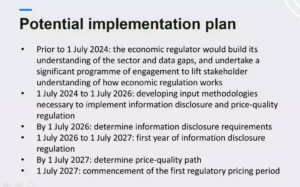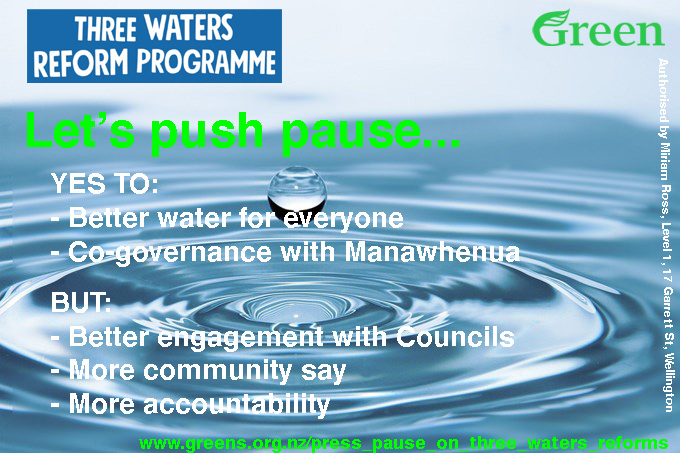This week we will run a workshop on Zoom for people to play with ideas of what would be possible if we had different models to deliver the 3 Waters in our towns and cities.
The Minister has promoted a deeply flawed model which cuts out local participation and steals the assets owned for generations at local level.
There are many thinking about how to respond but at the Tuesday Club we have a chance to do our thing and feed this into other forums.
To start your thinking processes here is an article sent to me during the week by somebody who knows local government inside out. It is based on the premise that central government has underfunded local government for ever. This is the first thing which needs to be remedied:
Getting the model right
It’s hard for the community to understand how there might be more options for three waters management and what those might look like, particularly in the absence of sensible options put forward by Central Government.
So here’s an example of co-funded infrastructure, that works and it’s happening right now.
Currently we all pay tax on our fuel purchases. A large proportion of that tax is invested in national and local roads. Councils as Local Road Controlling Authorities, who have intimate knowledge of their districts, decide, in many instances via public consultation with communities, on transport outcomes that are best for their communities. Based on those needs, Councils prepare business cases for transport projects and submits them to Waka Kotahi who, if their criteria are met, provides a percentage contribution to the cost of those transport works funded from the tax you and I pay on our fuel, usually around 50%. Councils work hard to get some of your money back for investment in your district. At a million dollars per kilometre just to resurface a road, (not to build one), it’s expensive infrastructure to provide and would be unaffordable to ratepayers if it was 100% funded by Councils. Starting to sound familiar? Even with transport agency funding district councils typically spend about one third of their operating budgets on Transport costs. Waka Kotahi manage investment in transport assets in line with a national land transport programme and through regional land transport plans and committees represented by Council staff. At the same time as the district getting what their community wants this structure provides a nationally focused, coordinated approach so the outcomes are all aligned with the same methodology. E.g., our roads are designed to be safer in all districts and reduce serious harm and death rates.
It’s not perfect, nothing is but it’s pretty good and a similar model would work for three waters, maintaining local governance, community voice while achieving the much-needed input from Central Government coffers and prevent the unthinkable, privatisation of three waters and the associated utility bills we will be faced with. When that happens you can compare it to saving most of your life to buy a house, the government takes it off you, then sells half of it to a private organisation who then charges you rent to live in it. Why? because you, your parents and perhaps theirs all paid rates that built our three waters network. The pipes your water comes through and which take away your waste and stormwater are yours, or ours collectively as a community. It costs money to maintain the network it’s not free to use but the thought of those assets being taken and potentially ending up with a private entity in the future who will charge you for the service of water delivery through that network you paid for is truly unthinkable.
There is a group around the country working on responses and alternatives to the 3 Waters as proposed by the government. We have been seeking opinions from a number of skilled individuals. We sought a legal opinion from a top lawyer, and he wrote:
As requested, I have carried out research into property rights and the expropriation of property. Both the requirements of the United Nations (of which NZ is a member) and the decisions of the Permanent Court of International Justice have supported the following rules with regard to the taking of property:
1. The property must be taken for a proper purpose with that having a public good. Please note that because the water functions are already carried out by the Councils it would be difficult for the Government to argue that it is taking the water assets for a proper purpose because that purpose is already being fulfilled.
2. The expropriation cannot be discriminatory.
3. The expropriation must be carried out in accordance with the due process of law.
4. Where assets are taken then adequate and proper compensation must be paid.
When you look at sections 121 – 126 of the Local Government Act there is already an obligation on the Councils to carry out what the Government is stating it will carry out. Because there is already a statutory obligation for all local authorities to look after all health, sewage, sanitation and water issues, the Government cannot say that it needs to take over these assets to carry out these functions. This would be an inappropriate use of central power.
From a person involved in local government who wrote:

Wonder if you’ve picked up on what looks to be the impact for the rates rebates scheme of three waters reform. Any charges levied by a water entity on the property owner will not be included in the amount of rates on which the rates rebate is calculated. For a lot of low income households, this could mean a significant additional cost. I suspect nobody’s picked this up as, if it had been, it’s virtually certain that grey power would be out with their placards!
https://www.newsroom.co.nz/ecan-exposed-regulator-hides-damning-report
At the “Water NZ” Lifelines Forum this week one of the slides included this…
Green Party Press Release on Three Waters

Leave a Reply